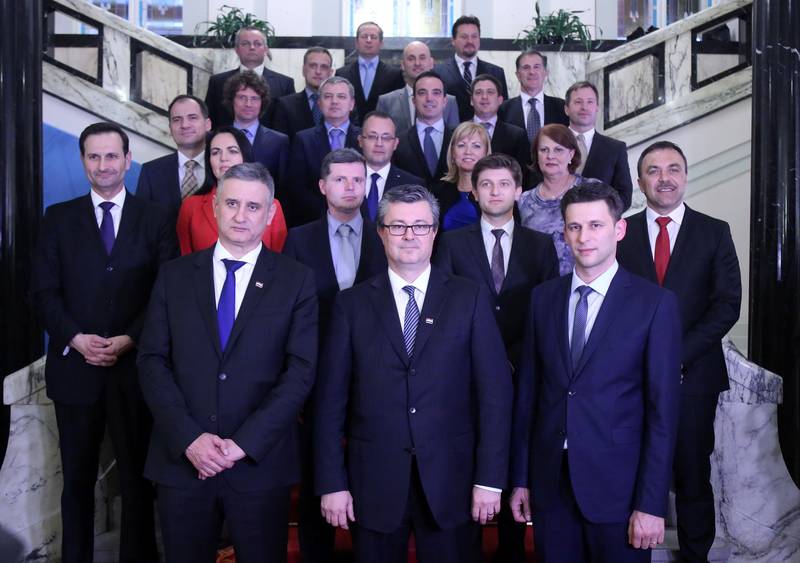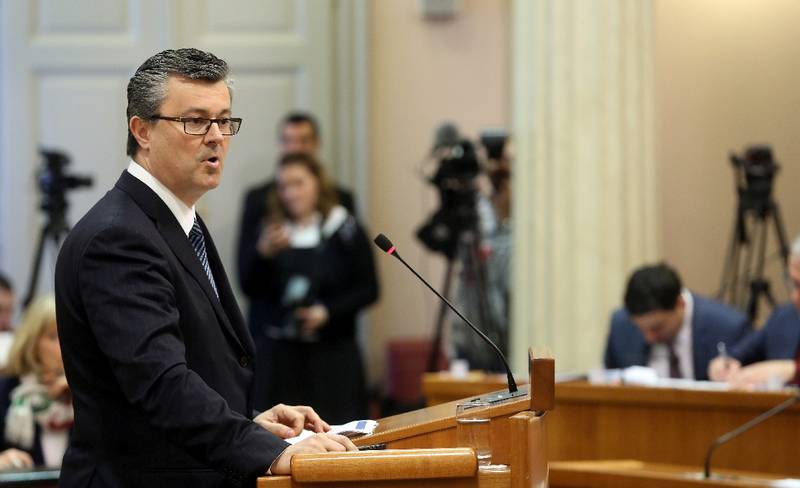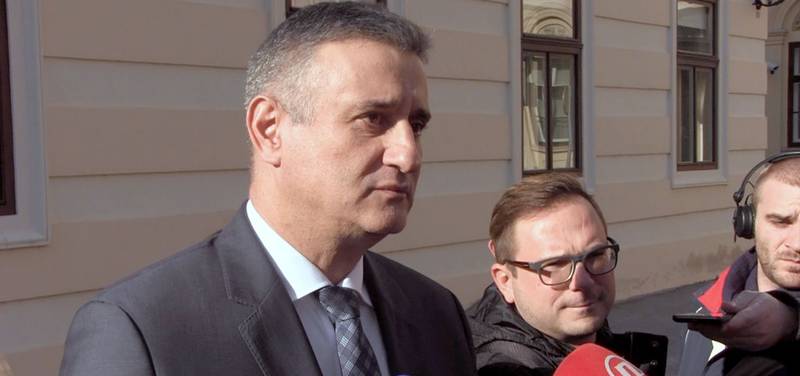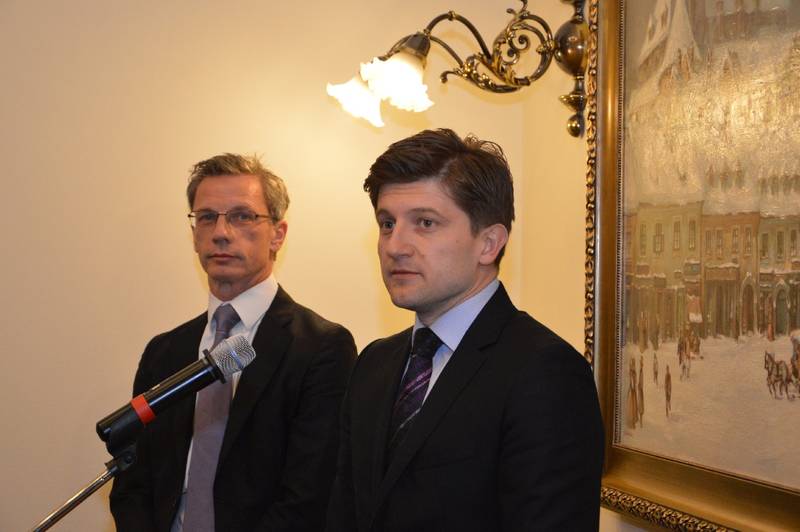Croatia Is not Poland, nor Hungary, but...
Adelina Marini, February 10, 2016
 Is Croatia making a step backwards with its new government? Is it stepping back from the image of a country that has turned its back to a corrupt past and was served as an example to everyone in South Eastern Europe, but especially to candidate states from the realm of ex-Yugoslavia? Is there a threat to the rule of law in another new member of the European Union? Is Croatia on its way against European liberalism? Should we be expecting the Croatian PM to be justifying the actions of the ruling majority in the European Parliament? Those are questions that have started to bubble up gradually after the parliamentary elections, which ended in a stalemate situation between two traditional political opponents - Zoran Milanović’s Social Democratic Party (SDP) and Tomislav Karamarko’s Croatian Democratic Union (HDZ).
Is Croatia making a step backwards with its new government? Is it stepping back from the image of a country that has turned its back to a corrupt past and was served as an example to everyone in South Eastern Europe, but especially to candidate states from the realm of ex-Yugoslavia? Is there a threat to the rule of law in another new member of the European Union? Is Croatia on its way against European liberalism? Should we be expecting the Croatian PM to be justifying the actions of the ruling majority in the European Parliament? Those are questions that have started to bubble up gradually after the parliamentary elections, which ended in a stalemate situation between two traditional political opponents - Zoran Milanović’s Social Democratic Party (SDP) and Tomislav Karamarko’s Croatian Democratic Union (HDZ).
The left-liberal coalition around SDP – “Croatia is Growing” – centred its campaign around the threat that if voters allowed the return of the HDZ to power through the right-to-far-right Patriotic Coalition, this would mean a return to the old, meaning the model of high-level corruption, militant nationalism, and Catholic conservatism. And the Patriotic Coalition based its campaign on the failures of the government led by Zoran Milanović in implementing important reforms for the country, the prolonged recession, high unemployment, and the outflow of Croats from the country. The almost equal results of the two coalitions, as well as the rising of the new political star MOST, made up of independent lists, has shown, however, that the situation in Croatia is far from what happened in Poland and Hungary.
Liberal forces still enjoy strong support and the surprising result of MOST showed that Croats want change, but not towards a non-liberal regime, but rather towards rule of law, structural reforms, a political class in service to the citizens. Although it toyed with the newest and not so new Croatian history, the Patriotic Coalition did not manage to secure the full majority it was counting on. This led to tough negotiations for the formation of a government.
Surely, the campaign did not go through without the usual political shootouts between the two largest political parties and coalitions along the axis Ustaša/Communists. This is an integral part of the Croatian political scenery, especially around election time. This dichotomy is so normal in the political life, that there were even jokes during the long gruelling coalition negotiations, when for almost a full month there was only talk of reforms – something quite unusual for the Croatian political daily life. A columnist for a large Croatian daily wrote a text back then, pleading to quit the reforms talk and go back to the Ustaša and Communists talk. After the formation of the new parliament, and especially after the formation of the new government, however, new doubts arose about whether this is just a game.
What is wrong?
A signal that dark clouds are forming above the Croatian horizon was the speech of the new Speaker of the Sabor (the Croatian parliament) professor Željko Reiner (HDZ) after the formation of the new parliament. While talking about the democratic values of Europe, but also about the Croatian national identity, quoting Voltaire about the importance of pluralism of opinions, professor Reiner announced his intention to reinstate the name Croatian State Sabor to the Parliament, raising fears of rebirth of Fascism, for this is what the Parliament was named during the Ustaša state, known as the Independent State of Croatia (NDH). The reaction in Croatian society was extremely strong. Željko Reiner defended himself by stating that he could not understand why people locked onto such an “insignificant part” of his speech.
Almost a month later, the formation of the new government, led by the unfamiliar member of the Croatian Canadian Diaspora Tihomir Orešković, unleashed a new wave of scandals, fears, and admissions that Croatia had not made peace with its past. What is curious is that the new government was voted on in the same week when MEPs crucified Polish Prime Minister Beata Szydło because of what is happening in Poland. After the failure of MOST’s request for the formation of a broad coalition with the participation of all leading political powers, a decision was taken to go for an expert government. This is the reason why Tihomir Orešković, who lived in Canada until very recently, was chosen. This comes out in his difficulty when speaking Croatian, which was the reason why he was long and fiercely criticised in Croatian media. The greater concern of many, however, was that he could turn out to be just a face, a puppet, whose strings are being pulled by the leader of the HDZ Tomislav Karamarko, who got the post  of First Deputy instead of Prime Minister. The second deputy PM in the government is the leader of MOST Božo Petrov.
of First Deputy instead of Prime Minister. The second deputy PM in the government is the leader of MOST Božo Petrov.
The Patriotic Coalition and MOST talked at length about reforms and most of all about the difficult economic situation, but actually the first steps of the new government were in an entirely different direction and again scandalised society. Two contentious appointments were made in the government, one of which ended with a resignation in the first days after assuming office. Word is of the former minister of army veterans, Mijo Crnoja (HDZ), who produced several scandals around himself. First of all he announced his intention of writing up a list of traitors, which was not received well by society and the coalition partner MOST. Later, the Croatian news site Index revealed that Minister Crnoja had received in the capacity of an army veteran a subsidised loan to build a house, but spent the money on something else. Moreover, he does not live at his permanent address.
This is a problem, for in Croatia there is a local income tax the size of which depends on the size of the municipality. It is 18% in Zagreb. With a registered address in a smaller place, but residing in Zagreb, there are suspicions of tax avoiding. After strong public pressure the minister resigned, but was defended by his leader Tomislav Karamarko, in whose opinion integrity is a relative term. What is more, Mr Karamarko, whose party is a part of the family of the European People's Party (EPP), announced in his defence that there hardly is a Croat who does not commit minor offences. This statement detonated the media community, to which the moral example of the government is a sacred cow.
The second appointment, which has made the headlines for weeks now, is of the minister of culture, Zlatko Hasanbegović, who became famous with a series of disturbing statements on anti-Fascism. In his opinion anti-Fascism is a word that is empty of substance, which occupies the time of "ballroom apologists", "ad hoc historians" or "subsidised activists". His theory in short is that anti-Fascists are masked Communists. He pointed out that Stalin, Tito, and Pol Pot were anti-Fascists. “We are not talking about anti-Fascism, but about the Yugoslav, totalitarian, communist inheritance”. The minister went even further, suggesting that the state patronage of the anti-Fascist celebrations should be cancelled, especially the commemoration of the Jasenovac massacre, which is regulated by law.
According to official data, quoted by Croatian media, between 80 000 and 100 000 people were murdered in Jasenovac, many of whom Serbs, but also Jews, Roma, Croats and others. There is an ongoing battle between left-wingers and right-wingers in Croatia on the Communist-Fascist line and which dates are to be commemorated. The newly appointed Foreign Minister Miro Kovač stated during his official visit to Germany this week that Croatia had not yet reconciled with its history. He said it in the context of the court case against the former boss in Yugoslavian and Croatian secret services Josip Perković, which is being held in Germany. “We need to have an open dialogue about the past in Croatia, which should include the opposition”, said Minister Kovač.
A reaction against the minister of culture also came from the influential Jewish human rights organisation Simon Wiesenthal. In an open letter to the government the centre expressed their “shock and indignation” at the appointment of Zlatko Hasanbegović. The letter sends sharp criticism towards the minister’s publications, “which he advertises on the website of the well-known white supremacist organisation”. “Even worse in the Croatian context, is the minister's blind refusal to recognise the genocidal nature of the Ustasha regime, and his disdain for the brave Croatian anti-fascists who fought against it. This absolutely baseless revision of the history of World War II and the Holocaust is totally outrageous and absolutely unacceptable”, continues the letter.
The ideological clash in Croatia gave the new PM Orešković an unpleasant surprise. He admitted he was not expecting Ustaša and Partisans to be in the centre of the public discourse. “But this is democracy, and in every democratic state there is a process and some things may need more time”, he said.
There is a media element as well
The feeling of a Polish-Hungarian scenario is further strengthened by the fact that there was a media element present in the entire row of scandals, which again included the minister of culture. In his very first day in office he surprisingly announced the closing of the special commission on non-profit media. This is a commission, which decides which media, working non-profit, should receive state subsidies. The decision was made without an in-depth discussion and strong arguments, and was subjected to a hearing in the respective parliamentary committee, but was boycotted by the members of the HDZ.
The Croatian journalist society also protested against the minister’s decision, voicing concerns by the coming of freedom of speech restrictions and hate speech. The minister thinks that it should not be his business to allocate state funds to media. The concerns about freedom of speech and, more specifically, the way it is interpreted came up in a different case as well. An anchor in a famous Zagreb TV channel announced openly on air recommendations that Zagreb citizens be careful when walking through a central square, where the Serb Orthodox Church is located and beware of the so called Chetniks. “Beware when walking on the Flower square, especially mothers with children, lest one of these Chetnik vicars runs out of the church and in the spirit of their bloody tradition carry through his bloody feast on our beautiful Zagreb square, which should probably have signs put up ‘beware, dangerous Chetniks close by’”.
There was a complaint filed because of this comment and the TV channel was put off the air for several days. Army veterans organised a protest in its support, which was also backed by a deputy speaker of parliament. There were mass shouts of the Ustaša salute “For homeland – ready!” at the rally. The police excused the lack of arrests for hate speech with the argument that the people shouting were too many. Similar shouts were not condemned by the Patriotic coalition during the traditional celebration of the unification of Croatia on August 5th in Knin.
The contradictory statements of the new minister of culture pulled several thousand people out on a protest at the government, organised on Facebook by the left-wing workers organisation Workers' Front. Surprising even to the front, the St Mark’s Square, where the buildings of Government, Parliament, and Constitutional Court are located, was filled by people protesting against the threat of thwarting the freedom of speech and the erosion of democracy. All this at the background of the more and more common rows on Twitter between journalists and the team that maintains the HDZ’s Twitter profile.
The battle for the security agencies

Another concerning fact is the mysterious battle for the intelligence agency SOA, which was headed by First Deputy PM Tomislav Karamarko years ago. The subject came up surprisingly as early as the coalition negotiations. MOST asked to have control over the power ministries. And got it. Now, however, Croatian society has been shaken for days by a scandal, linked to the agency, which has President Kolinda Grabar-Kitarović involved in it as well. She unexpectedly asked for the change of the agency’s boss, whose term expires anyway later this year. The Presidency gave no detailed argumentation, but pointed out that he had lost the president’s trust.
The actions of Kolinda Grabar-Kitarović have seriously undermined PM Orešković and strengthened the arguments of those, who believe both of them are puppets, whose strings are in the hands of Tomislav Karamarko. The dismissal of the boss of SOA happens with the signatures of the president and the PM. She, however, did not wait for the PM’s decision and signed first on Friday, leaving no useful move to the inexperienced prime minister, who announced he was going to make his decision after thoroughly studying the case. The president has removed her trust from the agency’s boss because of the wiretap scandal involving the boss of the Dinamo Zagreb football club Zdravko Mamić, who has several charges of corruption brought up, and whom she is a friend with (while this text was being written Zdravko Mamić resigned from the post of CEO of the club). She claims she was not warned that Mamić was under surveillance and saw this as a serious oversight by the SOA.
MOST boss Božo Petrov expressed reserves to the request for the change of Dragan Lozančić, but did not state categorically whether he would back the dismissal, or support him remaining in office until his term expires.
Is there a problem?
So far, the situation is not as worrying as in Poland, for there is no infringement on key legislation yet, which could lead to concerns about systemic violations of the rule of law. In Poland and Hungary the problems started with constitutional changes, which trimmed the powers of independent institutions and with dismissed media bosses. At the moment, this is impossible in Croatia, for the source of all troubles – the HDZ – does not have the necessary majority. MOST could fail to be the reformist power that they claimed they wanted to be, but could turn out to be something much more important – a deterrent force to changing Croatia’s course. This is a good news only in the short term. In the long term, it is a bad one, for it is clear that the promised reforms are unlikely to be implemented in such heated atmosphere of ideological and value division.
It’s still the economy, stupid!
As Robert Samuelson wrote in The Washington Post last week, it is still the economy that is most important. He wrote this concerning the American political discourse, which has also fallen prey to idea impotence, thus turning the election campaign into a true debacle. The economic situation in Croatia is much worse. Growth has just returned last year after more than six years of recession. In its winter economic forecast, the European Commission expects it to remain weak because of excessive debt in the private and public sector. GDP is expected to grow by 2.1% this year. The same expansion is expected for 2017, which is too insufficient for any sizable decrease of public debt, which is expected to rise to 87% of GDP this year and to peak to 87.4% next year.
Another problem in Croatia is unemployment, which is expected to start dropping this year, but slowly – from 16.2% last year, to 15.1% this year and 13.8% next year. Croatia has the third highest youth unemployment after Spain and Greece. During the first meeting of government, PM Tihomir Orešković announced the motto of his government: “Keep calm and govern on”. He said it in English, for he failed to find a suitable translation to Croatian. After all the small and large storms, which marked the start of his governing, however, the hopes for calmness and smooth governing are evaporating away more and more. There are forecasts of preliminary elections coming up here and there. Polls are showing that this is unlikely to bring a better result.
At the moment, the Patriotic coalition has a small lead to Croatia is Growing and support for MOST is dropping. Tomislav Karamarko continues to be the least liked politician and President Kolinda Grabar-Kitarović – the most liked. The European scene is another challenge, faced by the new government, where disunion is already strong and it is important to see whose side will Zagreb take. The former government led a line of moderate, or rather constructive Euroscepticism. Prime Minister Zoran Milanović did not advocate for more Europe, but did not want less either. In the refugee crisis, where Croatia is a part of the Western Balkans route, Zagreb refused to be a hotspot and demanded to keep its status of a transit state. It was important to the previous government that a solution was found of the root causes of the problem at the Turkish-Greek border.
It is evident from the first appearances of the new foreign minister that there will be no substantial change in this sense. It is important to see, however, what will come out of his attempts at looking for improvement of relations with neighbours, which the previous PM had arguments with, especially Hungary. Whether Croatia will become a part of the Visegrad Eurosceptic group, or will continue on its moderate course is a question still awaiting its answer. Zagreb’s opinion is expected as well on the British question, Schengen, and the euro area. Last but not least, it needs to be seen what position will Croatia take when the problem with rule  of law in Poland is discussed by the Council this spring. The Dutch presidency promised to organise the regular annual dialogue on the subject in the General Affairs Council in May.
of law in Poland is discussed by the Council this spring. The Dutch presidency promised to organise the regular annual dialogue on the subject in the General Affairs Council in May.
The first actions of the rest of the ministers in the government are a consolation that no shocks are expected in other key areas. The young new finance minister, Zdravko Marić, inspires great hopes with the continuous accent in his appearances on the need for implementing structural reforms, for following the Commission’s recommendations on the European semester and dealing with the enormous and growing public debt. Other ministers have also demonstrated attachment to European commitments and a will for consistency in government. A problem does exist, however, but so far it is only for the EPP.
Translated by Stanimir Stoev.
 Kolinda Grabar-Kitarovic | © KGK
Kolinda Grabar-Kitarovic | © KGK Jozo Rados | © European Parliament
Jozo Rados | © European Parliament Aleksandar Vucic, Andrej Plenkovic | © Vlada RH
Aleksandar Vucic, Andrej Plenkovic | © Vlada RH